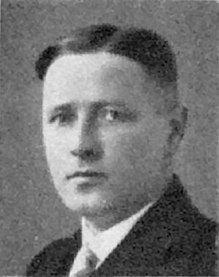Johannes Drees
Johannes Drees (born October 12, 1894 in Pye , district of Osnabrück ; † September 3, 1944, died near Compiègne , France) was a German politician of the Center Party and a member of the Reichstag .
The son of a farmer attended primary school in Pye until 1908 and then from 1908 to 1914 the Carolinum grammar school in Osnabrück . Drees last took part in the First World War with the rank of lieutenant in the reserve . From 1919 to 1922 he studied agriculture in Göttingen . In 1924 he was awarded a Dr. phil. PhD .
Initially from 1922 to 1926 as managing director of the Lower Saxony Farmers' Association based in Osnabrück, in 1926 he moved to the office of General Secretary of the Main Agricultural Association in Osnabrück. This position was the post of an officer in the Chamber of Agriculture. Forcibly expelled from his post in 1933 and dismissed, he found a new job in January 1934 in the administrative department of the rural peasantry. He held the office until 1937. It was only his refusal to join the NSDAP that prompted Drees to be removed from office after eleven years of service and put into retirement.
Drees had then exclusively with his wife Elisabeth geb. Nölker took care of the management of a Natbergen farm in the Osnabrück district, which he had acquired in 1926.
From 1925 to 1929, Drees volunteered as a center member in the district council in Osnabrück . After the election on May 20, 1928 , Drees then moved into the German Reichstag , where he represented constituency 14 ( Weser-Ems ) until November 1933 and participated in the Petitions Committee and the Committee on Social Affairs.
From 1937 to 1939 Drees was an appraiser for Wehrmacht issues at the state farmers' union in Hanover, but in the first days of the war in September 1939 he was called up for military service. He fell as a major in the reserve in the woods near Compiègne .
Works
- The importance of the heuerling system within the agricultural wage system, with special consideration for the conditions in the Osnabrück district. Diploma thesis Göttingen 1922.
- Labor balance between industry and agriculture, shown. on the heuerling system in the Osnabrück district. Diss. Phil. (typewritten) Göttingen 1924 (excerpt from: Jb. of the math.-natural science faculty Göttingen 1924).
- In addition, he wrote newspaper articles on agricultural and political issues.
literature
- Thomas Grove: The removal of the Osnabrück Reichstag member Dr. Johannes Drees resigned from office in 1933. Harmonization measure and political persecution. in: Osnabrücker Mitteilungen Volume 103, Osnabrück 1998, pp. 259–266.
- Thomas Grove, Helmut Lensing: Drees, Johannes. In: Emsland history. Volume 6. Ed. By the Study Society for Emsland Regional History, Dohren 1997, pp. 207–211.
Web links
- Literature by and about Johannes Drees in the catalog of the German National Library
- Johannes Drees in the database of members of the Reichstag
Individual evidence
- ↑ Johannes Voetlause: History of the Catholic country folk high school Oesede. In: klvhs.de. September 12, 1933, Retrieved January 25, 2019 .
| personal data | |
|---|---|
| SURNAME | Drees, Johannes |
| BRIEF DESCRIPTION | German politician (center), MdR |
| DATE OF BIRTH | October 12, 1894 |
| PLACE OF BIRTH | Pye |
| DATE OF DEATH | September 3, 1944 |
| Place of death | Compiègne |
